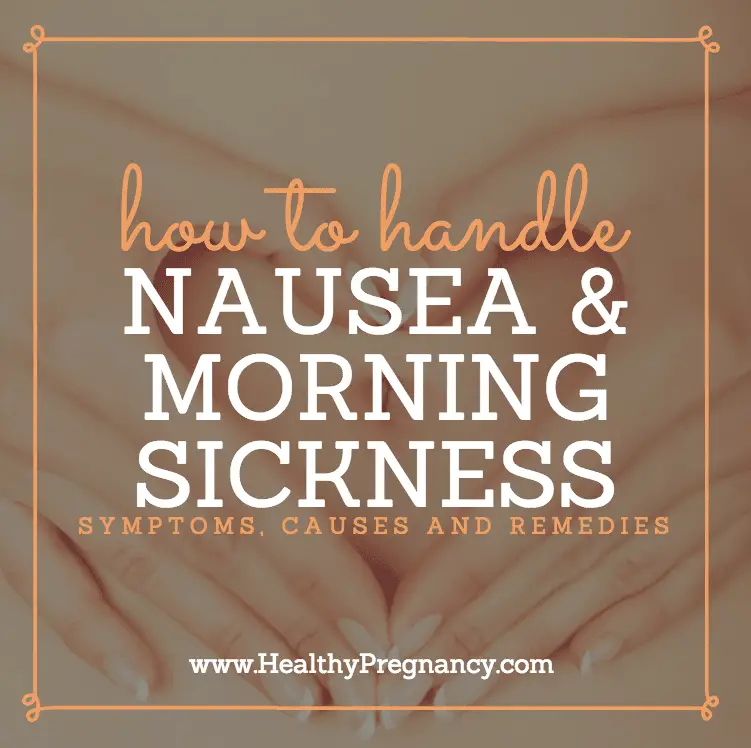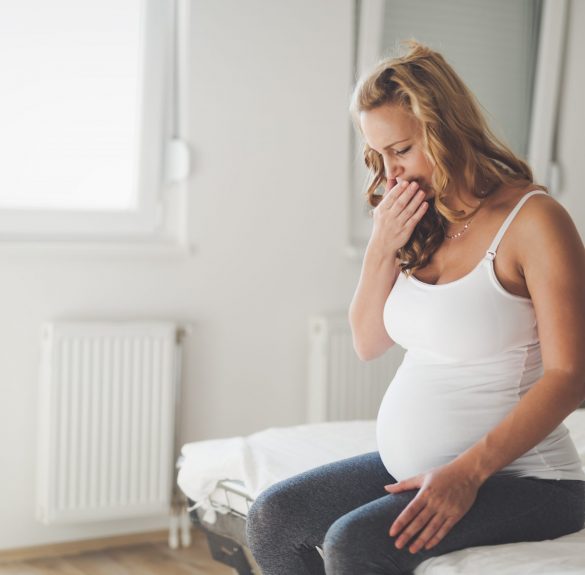Why You Feel Pregnant
It can be fairly common to experience some physical symptoms as you enter into what many people call the two-week wait, the period of time between when you ovulate and when you expect your period. These symptoms can include:
- Breast soreness
- Nausea and/or changes in appetite
While all of the symptoms could be pregnancy symptoms, they are more likely explained by either fluctuation in your hormones due to your menstrual cycle, or by other events in your life. These events can include illness, stress, or even something as simple as not enough sleep or too much exercise.
Some people experience premenstrual syndrome symptoms as pregnancy symptoms, where others do not typically have these symptoms every cycle.
When you experience a symptom that is not common to your cycle, it may be easily confused with a potential pregnancy.
To help relieve focusing on these symptoms, you can take positive steps for your physical and emotional health. Eating nutritious foods, quitting smoking, and limiting or avoiding alcohol will promote your health and wellness whether or not it turns out you are pregnant.
Also Check: Nutraburst Side Effects
What Is Pregnancy Nausea
Pregnancy nausea, known as morning sickness, is experienced in the initial stages of pregnancies. Pregnancy nausea can occur mostly during the day and also at night. Some women might feel nausea all day long. This feeling of nausea is very unpleasant and may affect daily activities. It occurs between 5 to 18 weeks of pregnancy. Around 50 70 percent of women with normal pregnancies have nausea. It could be either mild or extreme. Severe nausea is called Hyperemesis Gravidarums. Hyperemesis can cause vomiting multiple times in a day, loss of weight, and not eat. This condition requires doctor evaluation. It is treated using medication.
Causes Of Morning Sickness
Morning sickness is a side effect of pregnancy but not all women get morning sickness and not all morning sickness occurs in the morning. Doctors do not know specifically what causes morning sickness but they do suspect some causes, such as:
Hormones
Doctors believe that the increase of hormones can cause morning sickness. The pregnancy hormone hCG reaches its highest level when morning sickness is at its worst. The increase of estrogen and progesterone can also make it hard for your body to digest food properly.
Sensitivity
Some people are more sensitive to nausea and an upset stomach which can make them more likely to have vomiting during pregnancy. If you have a sensitive stomach, you are more likely to experience morning sickness in your first trimester than those who dont have a sensitive stomach.
These may be signs of a urine infection or dehydration and should be treated quickly.
Recommended Reading: How To Lose Pregnancy Weight While Breastfeeding
The Causes Of Nausea During Pregnancy
Pregnancy nausea is directly linked to the pregnancy hormone hCG, though the exact relationship is unclear . Early in pregnancy, when morning sickness is typically at its worst, hCG levels rise rapidly to help grow and nourish the fertilized egg.
Around the 12th or 13th week, the placenta is developed enough to take over these tasks. At this point, hCG levels tend to drop a bit, and then remain stable for the duration of your pregnancy. This is also the time most women begin to feel their nausea subside.
Why Does This Happen
Besides the presence of hCG in the body, other things can cause nausea during pregnancy as well, including:
- An increase in estrogen.
- Low levels of vitamin B6.
- An aversion to a specific food.
Interestingly, studies show mothers that experience nausea have a higher chance of a successful pregnancy .
When Does Morning Sickness End

Morning nausea usually peaks between weeks 8-11, and typically fades by the end of the first trimester. However, some women can experience nausea in their second trimester, and some even notice nausea near the end of pregnancy.
If your morning sickness lasts beyond your first trimester, you may be more sensitive to the effects of hormonal changes during pregnancy. Or you may just have a more delicate stomach. But its a good idea to bring up your morning sickness with your doctor or midwife to learn about your options for relief.
Don’t Miss: How To Lower High Blood Pressure During Pregnancy
What Does Nausea Feel Like In Early Pregnancy
When pregnant, a woman may have nausea or morning sickness that feels like: The overarching and persistent sensation that one has to throw up, yet without the pressing desire to actually do so. A sudden, intense need to vomit. A sensation that you are hungry, yet you are unable to consume anything due to lack of stomach capacity.
Contents
Adjust Your Diet And Take Your Vitamins
If nausea is affecting your appetite or the amount you eat, dont stress. During the beginning of your pregnancy, you dont need to eat a lot. Very small sips and bites will be plenty to keep your tiny fetus healthy. Your baby does not need much for nutrition yet.
There is one thing your growing baby needs you to stomach: a prenatal vitamin.
If you cant tolerate vitamins during the day, try taking them at night to see if you better tolerate them then. If you cant take a prenatal vitamin with iron due to an upset stomach, a chewable or gummy prenatal is a good alternative for the short term. When you start feeling better, resume taking prenatal vitamins with iron.
To help quell your morning sickness, try these diet changes:
These foods can help relieve nausea:
Don’t Miss: What Vitamins Should I Take If Trying To Get Pregnant
Cramping And Spotting During Early Pregnancy
From weeks 1 to 4, everything is still happening on a cellular level. The fertilized egg creates a blastocyst that will develop into the fetuss organs and body parts.
About 10 to 14 days after conception, the blastocyst will implant in the endometrium, which is the lining of the uterus. This can cause implantation bleeding, which may be mistaken for a light period. It does not occur for everyone. If it does occur, it will usually happen around the time you expect your period.
Here are some signs of implantation bleeding:
- Color. The color of each episode may be pink, red, or brown.
- Bleeding. Implantation bleeding is usually much less than your usual period. Its often described as light bleeding that never turns into a flow or enough to need a tampon.
- Pain. Pain is usually milder than your usual menstrual pain. It may involve some cramping. It can be moderate or severe, but its most often mild.
- Episodes. Implantation bleeding is likely to last less than 3 days and does not require treatment. It can sometimes last only a few hours.
Tips For Dealing With Pregnancy Nausea:
Pregnancy can be tough for women, but there are a few ways to make it bearable. The following are some tips:
Don’t Miss: What Causes Constipation During Pregnancy
What Is Hyperemesis Gravidarum
Hyperemesis Gravidarum is a serious condition that develops in approximately one percent of pregnant women .
While commonly described as severe morning sickness, that terminology fails to describe the reality of the situation. HG is often debilitating and can threaten the life of both the mother and baby.
HG is different from traditional pregnancy nausea in that:
- The nausea is constant and severe.
- You cannot eat or drink anything without vomiting.
- You feel an excess of saliva in your mouth.
- You lose more than 5 percent of your pre-pregnancy body weight.
- You cannot function in your regular life.
This condition is also accompanied by side effects, including:
- Lower birth rate for baby.
Aside from the physical symptoms, HG can make it nearly impossible to do regular activities such as going to work, caring for yourself, or taking care of your family. This can contribute to depression, feelings of failure, and isolation.
For most women experiencing HG, the symptoms subside by the 20th week of pregnancy. However, for some women, it will last until they deliver.
In some cases, women need to be hospitalized to ensure they remain properly hydrated and nourished since they cant keep anything down when eating.
HG moms are warriors, pregnancy is already a sacrifice of yourself and having to push through an unrelenting sickness like HG is extremely difficult. There are resources to support you, such as hyperemesis.org. Your care provider can assist you with more.
How Soon Is Too Soon To Take A Pregnancy Test
A pregnancy test can usually detect pregnancy about 5 days before your expected period or when your period is supposed to start. If you’re tracking ovulation, the earliest a pregnancy test can be taken is generally 6-7 days past ovulation .
The process of fertilization to implantation can vary from person to person, so sometimes, it can take longer to detect. This is why the general recommendation is 6-12 DPO to take a test. To understand this, let’s do a quick reproduction 101 recap.
During ovulation, you release an egg from your ovary. The egg is then captured by the fimbriae of the fallopian tube and then swept into the tube where it has the opportunity to meet sperm. If fertilization occurs, the egg will spend about 5 days maturing and traveling the fallopian tube before reaching the uterus.
Once in the uterus, a viable embryo will implant on the uterine wall, leading to pregnancy. It takes time for the embryo to burrow into the wall of the uterus and begin secreting hCG .
Ovulation usually happens mid-cycle, about two weeks before your period, but it can vary from month to month and even from woman to woman. While many people are told we all ovulate on day 14 every cycle, this simply isnt true. You may ovulate on day 10 or day 21, just depending on your cycle, current health, and life factors like stress. But in general, it is usually consistently around the same handful of days within each persons cycle.
Also Check: What To Take For Yeast Infection While Pregnant
What Would Early Pregnancy Feel Like
Very early pregnancy symptoms may show up before you miss your period, as soon as a few days after conception, while other early signs of pregnancy might appear around one week after sperm meets egg. Still others often appear a few weeks or so following conception.
From the What to Expect editorial team and Heidi Murkoff, author of What to Expect When You’re Expecting. What to Expect follows strict reporting guidelines and uses only credible sources, such as peer-reviewed studies, academic research institutions and highly respected health organizations. Learn how we keep our content accurate and up-to-date by reading our medical review and editorial policy.
When Pregnancy Is Unintentional

If you had unprotected sex or a contraceptive failure and fear you could get pregnant, emergency contraception is an option. Commonly called the “morning-after pill,” medications are available over-the-counter that can prevent pregnancy if taken within five days of having unprotected sex.
The sooner you take these medications, the more effective they are in preventing unintended pregnancy. These medications do not cause an abortion, but rather prevent a pregnancy from being established.
Recommended Reading: Do You Get Std Tested When Pregnant
Treatments For Morning Sickness
Unfortunately, there’s no hard and fast treatment that will work for everyones morning sickness. Every pregnancy will be different.
But there are some changes you can make to your diet and daily life to try to ease the symptoms.
If these do not work for you or you’re having more severe symptoms, your doctor or midwife might recommend medicine.
Complications Of Morning Sickness:
Morning sickness may cause loss of appetite. Many women fear this might harm their baby as it prevents essential nutrients from reaching the baby. However, doctors say that mild nausea is not generally harmful.
It is best to consult a doctor in case morning sickness continues 3 4 months after pregnancies. Morning sickness is not severe enough to affect fetal growth and development.
Also Check: Has Anyone Whitened Their Teeth While Pregnant
When Does Conception Happen
Conception occurs between 12 and 24 hours after ovulation. Its sometimes hard to pinpoint ovulation, so using ovulation predictor kits or tracking your menstrual cycle on a calendar may be helpful. The two biggest factors in conception are:
- The timing of sexual intercourse with ovulation.
- Egg and sperm health.
Home Or Natural Remedies
- Avoiding foods and smells that trigger your nausea.
- Keeping soda crackers by your bed and eating a couple before getting up. Allow some time for digestion, and rise slowly once you are ready.
- Eating smaller meals more frequently throughout the day instead of three big meals.
- Drinking less water/fluids with your meals, and instead, drink them between meals.
- Eating drier, plain foods such as white rice, dry toast, or a plain baked potato instead of richer, creamier foods.
- Sucking on hard candy.
- Keeping rooms well ventilated or having a fan close by for easier breathing. If neither of these is possible, take time to go outside to get some fresh air.
- Getting plenty of rest Listen to your body when you are feeling fatigued, and try lying down.
- Sniffing ginger or lemons, or drinking ginger ale or lemonade, which can help ease the feeling of nausea.
- Talking with your healthcare provider about the prenatal vitamins you are taking having too much iron may cause nausea, and switching to a different vitamin could help.
- Asking your healthcare provider about taking a vitamin B-6 supplement, which has proven to help reduce nausea and vomiting.
You May Like: What Is The Best Stool Softener For Pregnancy
Some Early Signs Of Pregnancy Women Must Watch Out For
Women who have been trying to conceive may notice that their body temperature in the mornings is marginally higher, post ovulation. This can also be an indicator to take a quick pregnancy test. Universally, the commonly discussed symptoms of conception or pregnancy indicators are morning sickness which appears after 10-14 days of a missed period cycle , and more than 70 percent of women go for a pregnancy test only after they notice these signs, says Dr Mahajan.
A few uncommon changes that vary within individuals that could point at pregnancy include food aversions, change in taste, nausea, vomiting, backache, increased frequency of urination, mood swings, hunger pangs, change in sleeping patterns, and food cravings. These start to occur as soon as the period is missed or just two weeks after conception.
Concerns With Nausea During Pregnancy
If you are experiencing severe nausea and vomiting, and the above treatments do not appear to be helping, contact your doctor for further suggestions. While nausea during pregnancy can be normal, it can also point to a problem that needs to be addressed.Examples of potential conditions seen with severe nausea are:
- Hyperemesis Gravidarum, which is a medical condition that causes you to lose essential nutrients needed during pregnancy.
- Molar Pregnancy, which occurs when an abnormal growth of tissue develops within the uterus.
Want to Know More?
Compiled using information from the following sources:
1. Beckmann, C., Ling, F. W., Barzanksy, B. M., Herbert, W., Laube, D. W., & Smith, R. P., Obstetrics and Gynecology . Baltimore, MD: Lippincott Williams & Wilkins.
2. Mayo Clinic, Guide To A Healthy Pregnancy. New York, NY: HarperCollins Publishers Inc.
Don’t Miss: When Does Breast Milk Come In During Pregnancy
When Does Morning Sickness Start In Pregnancy
Morning sickness usually starts sometime between 4 weeks and 9 weeks of pregnancy, and may be at its worst over the following month.Keep in mind that the time when morning sickness starts may be different for each mom-to-be and can even differ between pregnancies. And some pregnant women never experience morning sickness at all.If youâre not sure how far along you are in your pregnancy, you can find out using our Due Date Calculator or by turning to your healthcare provider.
RELATED PREGNANCY TOOL
Why You Might Feel Pregnant

It can be fairly common to experience some physical symptoms as you enter into what many people call the two-week wait, the period of time between when you ovulate and when you expect your period. These symptoms can include:
- Breast soreness
- Nausea and/or changes in appetite
While all of the symptoms could be pregnancy symptoms, they can also be explained by either fluctuation in your hormones due to your menstrual cycle, or by other events in your life. These events can include illness, stress, or even something as simple as not enough sleep or too much exercise.
Some people experience premenstrual syndrome symptoms as pregnancy symptoms, whereas others do not typically have these symptoms every cycle.
When you experience a symptom that is not common to your cycle, it may be easily confused with a potential pregnancy.
To help relieve focusing on these symptoms, you can take positive steps for your physical and emotional health. Eating nutritious foods, quitting smoking, and limiting alcohol will promote your health and wellness whether or not it turns out you are pregnant.
Read Also: How Quickly After Getting Pregnant Do You Get Morning Sickness

